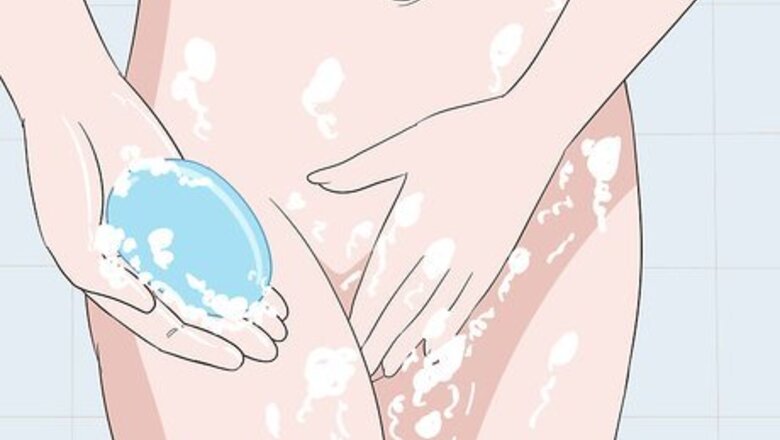
views
Relieving Discomfort During an Outbreak
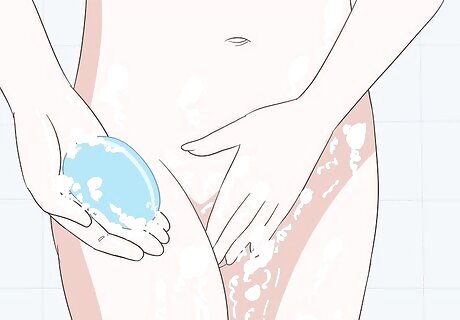
Wash and dry the sores gently every day to prevent infections. Washing the sores won’t get rid of them, but it will prevent them from getting infected. Once a day, wet the sores with warm water and scrub them very gently with antibacterial soap. Rinse them and pat them dry with a clean towel. Cleaning your sores might be painful, but it’s very important to prevent them from getting worse. Do your best to be gentle and avoid causing more pain. Don’t use that towel more than once. Wash it right after you dry yourself with it. Always wash your hands after cleaning the sores to avoid spreading the virus to others.
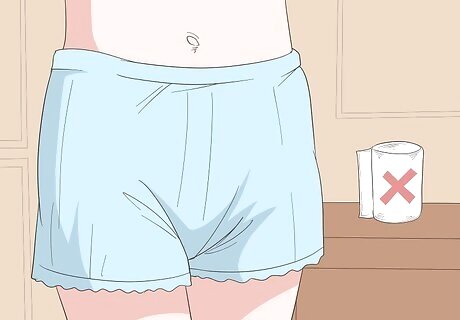
Keep the sores uncovered so they stay dry. Don’t cover the sores with any kind of gauze or bandage. You might want to keep them covered to prevent them from rubbing on your clothes, but coverings will trap moisture and could make the sores worse. Leave them uncovered so they airdry on their own.
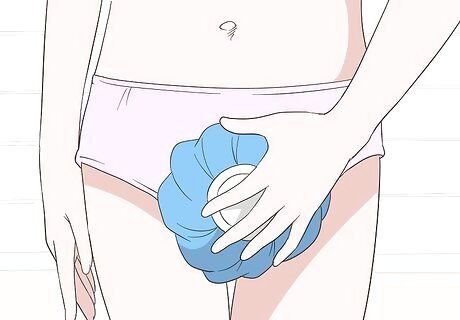
Apply a cold compress to your sores to relieve the pain. Cold packs can numb the area, so they’re a big help if your sores are painful. Wrap a cold pack in a towel and hold it against your sores for 15-20 minutes at a time. You can repeat this as often as you want. Always disinfect the compress before and after using it. Throw the towel in the wash and rub the cold pack with some alcohol. Never apply ice directly to your skin. This could cause frostbite.

Soak in a warm bath to sooth the sores. Heat can also help relieve the pain from your sores. Try taking a daily bath and soak for about 20 minutes. This could soothe your pain. You could also add Epsom salt to the bath to reduce pain and itching further. Soak for the same amount of time whether or not you use Epsom salt. Remember to dry your sores after your bath and then wash the towel. Do not add bubbles or fragrances to the bathwater. This could irritate the sores.
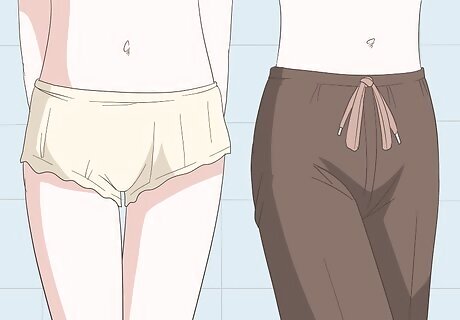
Wear loose-fitting pants and underwear to prevent friction on the sores. Tight pants and underwear will put a lot of pressure on your sores, which could make the pain much worse. Instead, wear loose-fitting clothes during an outbreak so they don’t rub on your sores. Cotton underwear is best because it absorbs moisture and keeps the area dry.
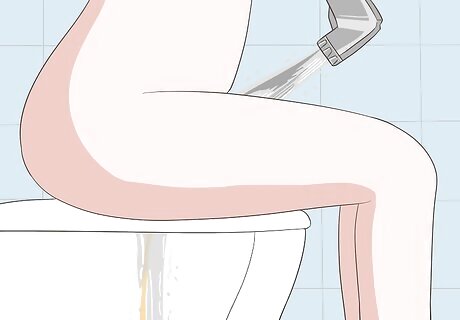
Urinate while pouring water over your genitals if urinating hurts. It’s possible that urinating will be painful during an outbreak, especially if the urine touches any of the sores. Some people find relief from pouring a cup of water over their genitals as they urinate. Try this out if urinating hurts for you. This tends to help women with genital herpes more than men. It’s less common for men to feel a lot of pain when they urinate.
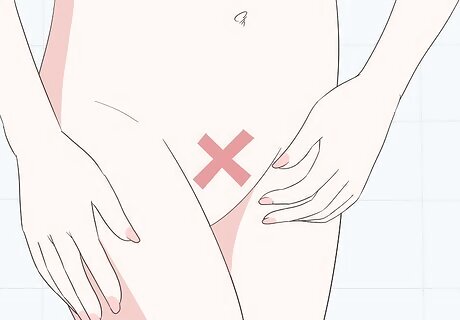
Avoid touching your sores unless you’re cleaning them. It might be tempting, but resist touching any of your sores. This could irritate them and also spread the virus. Don’t touch or pick at any of your sores unless you’re cleaning them. Always wash your hands after touching your sores for any reason, even if it’s an accident.
Preventing Outbreaks
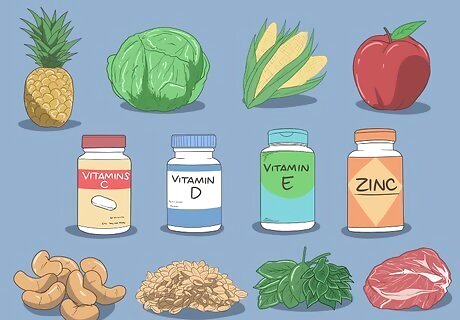
Follow a healthy diet to boost your immunity. Nutrition is a big part of your immune health, and a healthy diet could prevent future outbreaks. Include plenty of fresh fruits, vegetables, lean proteins, and whole grains in your diet to provide your immune system with the nutrients it needs. In general, vitamins C, D, and E, zinc, and carotene are good for your immune health. Most of these nutrients come from fruits, vegetables, nuts, seeds, and lean meats. Also avoid foods that tend to lower your immunity like processed, sugary, fatty, or fried items. Stick with fresh food as much as possible.

Get plenty of sleep every night. Sleep is another important part of your immune health. Do your best to get 7-8 hours of sleep each night to keep your immunity up and prevent future herpes outbreaks. If you have trouble getting to sleep at night, try doing some relaxing activities before bed. Reading, stretching, listening to soft music, or taking a bath are all great ways to wind down.

Reduce stress to avoid triggering outbreaks. Periods of stress are definitely a trigger for herpes flareups. If you're currently having an outbreak, then this is probably stressing you out even more. Learn some stress-reducing techniques to relax yourself during stressful times. If you handle your stress right away, you might be able to avoid or shorten an outbreak. Relaxation exercises like meditation or yoga are great ways to clear your mind. Try spending 15-20 minutes each day doing one of these activities to reduce your overall stress. Doing things you enjoy is also a great stress-reducer. Make some time for your hobbies so you don’t feel too overwhelmed.
Protecting Others
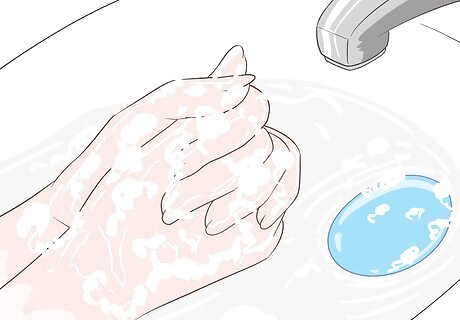
Wash you hands every time you touch one of your sores. Any time you touch your sores, the herpes virus could get onto your hands. If you don’t wash them, you could spread the virus to other people. Wash your hands every time you touch any of your sores, even if it’s an accident.

Inform your partner about your condition before having sex. All of your partners deserve to know about your condition so they can make informed decisions about their own health. While it might be embarrassing, tell all of your partners that you have herpes before having sex. That way, both of you can take the proper steps to avoid spreading the virus. Be prepared for some people to decline sex with you when you tell them you have herpes. This might be hard to deal with, but try to understand that it’s their choice to make and they have a right to make the decision that they think is best for them.
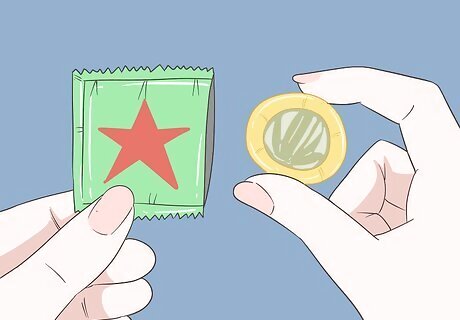
Wear a condom every time you have sex. Even if you don’t currently have an outbreak, you could still spread herpes during sex. Always use a condom to prevent direct genital contact and reduce your chances of spreading the virus. If you or your partner use hormonal birth control, this won’t protect you from STIs like herpes. If you’re allergic to latex, polyurethane condoms are also effective for blocking the herpes virus.

Avoid all sexual contact during a herpes outbreak. If you have an outbreak, then even a condom might not be enough to prevent the virus from spreading. Don’t have vaginal, anal, or oral sex at all until your sores are completely gone. Even if you use a condom, you could have herpes sores in spots that the condom doesn’t cover. This is why you shouldn’t have any sexual contact during an outbreak.
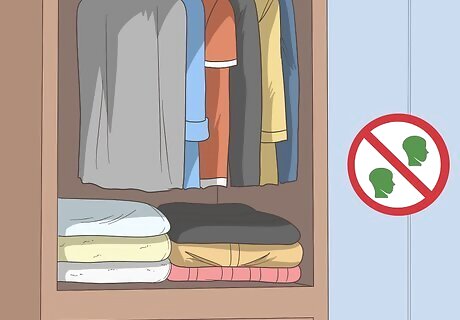
Use your own towels, clothes, utensils, and personal items. While it’s less common, herpes could spread to other people from surfaces that you’ve used. Don’t share towels, clothes, or personal items with other people to keep the virus contained. If you don’t use your own cups or utensils, then make sure you wash these items thoroughly before anyone else uses them. Using all of your own personal items is a generally good practice anyway. It prevents infections from spreading to other people in your home.


















Comments
0 comment